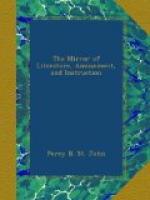There was no bread within the wreck,
And water we had none,
Yet he murmured not, and cheered me
When my last hopes were
gone;
But I saw him waste and waste away,
And his rosy cheek grow
wan.
Still on we drove,
I knew not where,
For many nights and days,
We were too weak to
raise a sail,
Had there been one to raise.
Still on we went, as the west wind drove,
On, on, o’er the
pathless tide;
And I lay in a sleep, ’twixt life
and death,
And the child was at
my side.
And it chanced as we were drifting on
Amid the great South
Sea,
An English vessel passed us by
That was sailing cheerily;
Unheard by me, that vessel hailed
And asked what we might
be.
The young child at the cheer rose up,
And gave an answering
word,
And they drew him from the drifting wreck
As light as is a bird.
They took him gently in their arms,
And put again
to sea:—
‘Not yet! not yet!’ he feebly
cried,
‘There was a man
with me.’
Again unto the wreck they came,
Where, like one dead,
I lay,
And a ship-boy small had strength enough
To carry me away.
Oh, joy it was when sense returned
That fair, warm ship
to see.
And to hear the child within his bed
Speak pleasant words
to me!
I thought at first that we had died,
And all our pains were
o’er,
And in a blessed ship of Heaven
Were sailing to its
shore.
But they were human forms that knelt
Beside our bed to pray,
And men, with hearts most merciful,
Did watch us night and
day.
’Twas a dismal tale I had to tell
Of wreck and wild distress,
But, even then, I told to none
The captain’s
wickedness.
For I loved the boy, and I could not cloud
His soul with a sense
of shame:—
’Twere an evil thing, thought I,
to blast
A sinless orphan’s
name!
So he grew to be a man of wealth,
And of honourable fame.
And in after years, when he had ships,
I sailed with him the
sea,
And in all the sorrow of my life
He was a son to me;
And God hath blessed him every where
With a great prosperity.
The Amulet for 1830.
* * * * *
THE LITTLE MAJOR’S LOVE ADVENTURE.
You must know, when I was in the 18th light dragoons, I was quartered in Canterbury; and having got some introductory letters, I contrived to make out a pleasant time enough. One of my visiting-houses was old Tronson’s the banker’s—devilish agreeable family—four pretty girls—all flirted—painted on velvet—played the harp—sang Italian, and danced as if




